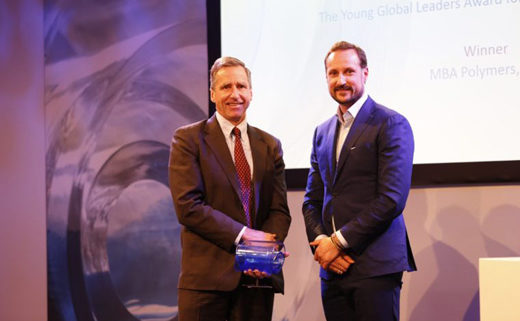MBA Polymers wins two prestigious accolades at the Circulars Awards, including best circular economy story
We’re delighted to share that MBA Polymers won the ‘Young Global Leaders Award for Circular Economy SME’ at the Circulars Awards in January. The Circulars are the world’s leading awards for contributors to the circular economy, designed to honour circular achievements across businesses, the public sector and civil society. They’re an initiative of the World Economic Forum (WEF) and the Forum of Young Global Leaders, and shine a spotlight on innovations that stand to decouple growth from resource use. Our founder and board member, Mike Biddle, collected the prize at the awards ceremony, which was held at the latest WEF annual meeting in January.
MBA Polymers was also selected by the audience – comprised of leading multi-nationals, circular economy experts and NGOs – to win the overall ‘Davos Prize’ for ‘the most impactful and innovative circular economy story’. We won the accolade despite stiff competition from sustainability pioneers such as Patagonia and Nike.
Commenting on the award, Mike said: “This is recognition for our achievements in creating advanced technologies to transform some of the world’s most complex plastic waste streams into valuable raw materials, and delivering more than 170,000 tonnes of high quality recycled plastics to major manufacturers each year.”

The circular economy and plastics featured strongly at this year’s WEF, with talks exploring circular economy investment opportunities in Europe (in food, mobility and the built environment) and circular design, as well as strategies to re-think plastic packaging. In particular, the New Plastics Economy Initiative launched its latest research on plastic packaging, complete with a global action plan supported by 40 major companies including Unilever, Veolia and Danone.
The report, ‘The New Plastics Economy: Catalysing action‘, was produced by the Ellen MacArthur Foundation and the WEF. It provides a global action plan to move towards 50% high quality, economically viable recycling and 20% reuse of plastic packaging. It also highlights the pressing need for innovation to redesign the remaining 30%. Its authors claim it’s the first report to provide a clear transition strategy for the global plastics industry to design better packaging, increase recycling rates, and introduce new models for making better use of packaging.

